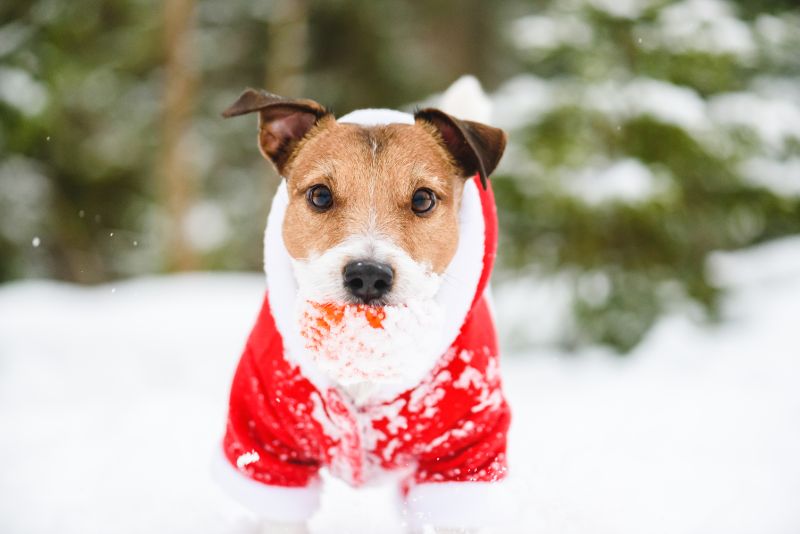How to Keep Your Pet Fit During the Holidays

It probably comes as no surprise that “get healthier” is the most popular New Year’s resolution among Americans. Holiday meals and parties, cookies at the office and at Grandma’s house, and extra treats from friends and neighbors can add up over time, causing a run on gym memberships and diet cookbooks come January 2nd.
Pets, too, can suffer the ill effects of overindulgence, including the health and mobility consequences that go along with extra weight. Fortunately, it doesn’t have to be difficult to keep your furry friend fit and trim during the holidays.
A little bit of planning, a commitment to your pet’s well being, and the support of your Lone Tree Veterinary Medical Center team will go a long way toward making sure your best pal feels and looks its best all year long.
Get Moving to Keep Your Pet Fit
Colorado winters are nothing to sneeze at, but that’s no excuse to forgo exercise for your pet (or yourself!). Try the following ideas for safe and fun pet exercise this holiday season:
- Invest in waterproof outerwear for your dog, and get out for a walk or hike regardless of the weather. Be mindful of paw care – supply your pet with booties or paw wax and be sure to clean the paws thoroughly when you arrive home.
- Have a snowball fight with your pet, build a snowman (or snowdog), or explore a snowy trail together.
- Indoor only pets can also benefit from your creativity. Research or invent fun ways to keep them entertained (think balls, tug o’ war, hide n’ seek, cat trees, cardboard boxes or paper bag fun, and DIY pet games).
- If you are regularly gone all day, enlist the help of a friend, neighbor, or pet sitter to walk and/or play with your pet in the middle of the day. Plan for a walk or playtime with your pet when you get home.
The Importance of Nutrition
Calories count for pets as much as they do for people, and too much food (even the healthy stuff) can lead to excess pounds. It’s easy to slip a table scrap (or two, or three) to a begging pet, especially during the holiday season but, besides adding extra calories, human foods can create gastrointestinal problems for pets. Further, many of our favorite holiday foods can be toxic to pets (think chocolate, onions, grapes, fatty meats or anything with Xylitol added), and even the smallest amount of any fatty food can lead to a serious inflammatory condition called pancreatitis.
The majority of your pet’s nutrition should be in the form of a high quality, commercially prepared pet food formulated by a reputable manufacturer (such as Science Diet, Royal Canin, Purina) for your pet’s life stage – puppy, adult, senior. And, the importance of portion control cannot be understated. Your veterinarian can help you determine the correct daily amount for your pet’s size and activity level.
A Word About Treats
Since a portion of your pet’s daily food intake can come from treats, the easiest (and safest) way to award treats to your pet is to take a small amount out of its daily food portion and set aside for treats to give in between meals.
If you’d like something special or different, and since we do not recommend feeding human food to pets, there are many safe commercially prepared treat options available that are formulated specifically for pets. They come in a variety of flavors and treat types, including, hypoallergenic, low calorie, and dental treats. We make a point of carrying our favorite “pet-approved” treat products in our lobby store.
Remember that extra treats also count as extra calories, so if you’re giving treats, adjust the amount of food you’re feeding that day to compensate for the treat calories!
It Takes Both
Proper nutrition and food portions combined with daily activity go a long way towards helping our pets stay trim and feeling good throughout their lives. It also helps us humans stay on our fittest toes, as well!
We hope you, your family, and your pets have a magical (and safe!) holiday season. As always, please don’t hesitate to reach out to us at Lone Tree Veterinary Medical Center with your questions and concerns regarding your pet.



